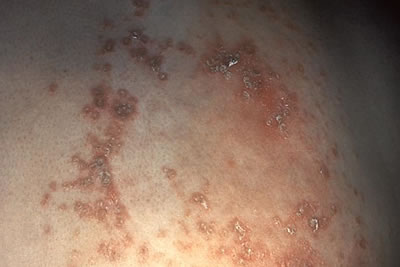Shingles
Shingles or herpes zoster is
a viral infection characterized by inflammation of the certain
nerves called the sensory ganglia in the spine
and skull, accompanied with red rashes or blisters. It usually
occurs only on one side of the body.
Symptoms of Shingles
The symptoms of shingles include:
- Burning, tingling and painful sensation on one side of the
body or face
- Red rashes or clusters of blisters on one side of the body
or face
- Various sizes of blisters (from half-dollar to palm-sized)
- May or may not be accompanied by headache and fever before
the rash breakouts
Shingles that occur in the face may affect the eyes and even
lead to blindness.
The duration of shingles outbreak is usually between 2 to 4 weeks.
However, some people may develop persistent pain after the rashes
and blisters go away, in a condition called postherpetic neuralgia.
This condition may last for months to years.

Shingles rash.

Rash in a child diagnosed with shingles.
Causes of Shingles?
Shingles are caused by the the virus varicella zoster,
same virus that causes chickenpox. After childhood chickenpox
outbreak, the virus continue to live quietly in nerve cells in
the spine. Many years later, it can emerge to create the shingles
outbreak.
The virus is passed either by people suffering from active shingles
outbreak or from chickenpox to those who have never had chickenpox.
It is not contagious to people who have had chickenpox.
Who Gets It?
Everyone who have had chickenpox can develop shingles. Although
it is not known what triggers the reactivation of the virus, it
may have something to do with weakened immune system. Most people
who develop shingles are also those who:
- Have weak immune system or immune system diseases
- Are taking medicines to suppress their immune system
- Are infected by AIDS
- Have cancer or are being treated for cancer
Can Shingles be Prevented?
Yes - for those who have not been exposed to chickenpox, there
is a new vaccine that may prevent both chickenpox and shingles.
Even for those who have had chickenpox during childhood, vaccination
may prevent the development of shingles.
Treatment for Shingles?
Your doctor may prescribe:
- Antiviral medicines.
When diagnosed early (within 3 days of the initial rash outbreak),
prescription antiviral such as acyclovir and famciclovir can
shorten the duration of the disease.
- Antibacterial lotion for scabs and blisters
- Cool compress for blisters
Early action is key to treating shingles, as it not only can
shorten the duration of the disease, but also reduce the chances
of developing postherpetic neuralgia.
Treatment for postherpetic neuralgia include:
- Analgesics
- Low-dose antidepressants
- Over-the-counter capsaicin or pain-killer cream
- Transcutaneous electrical stimulation (TENS), which uses low
intensity electrical currents to help relieve pain


